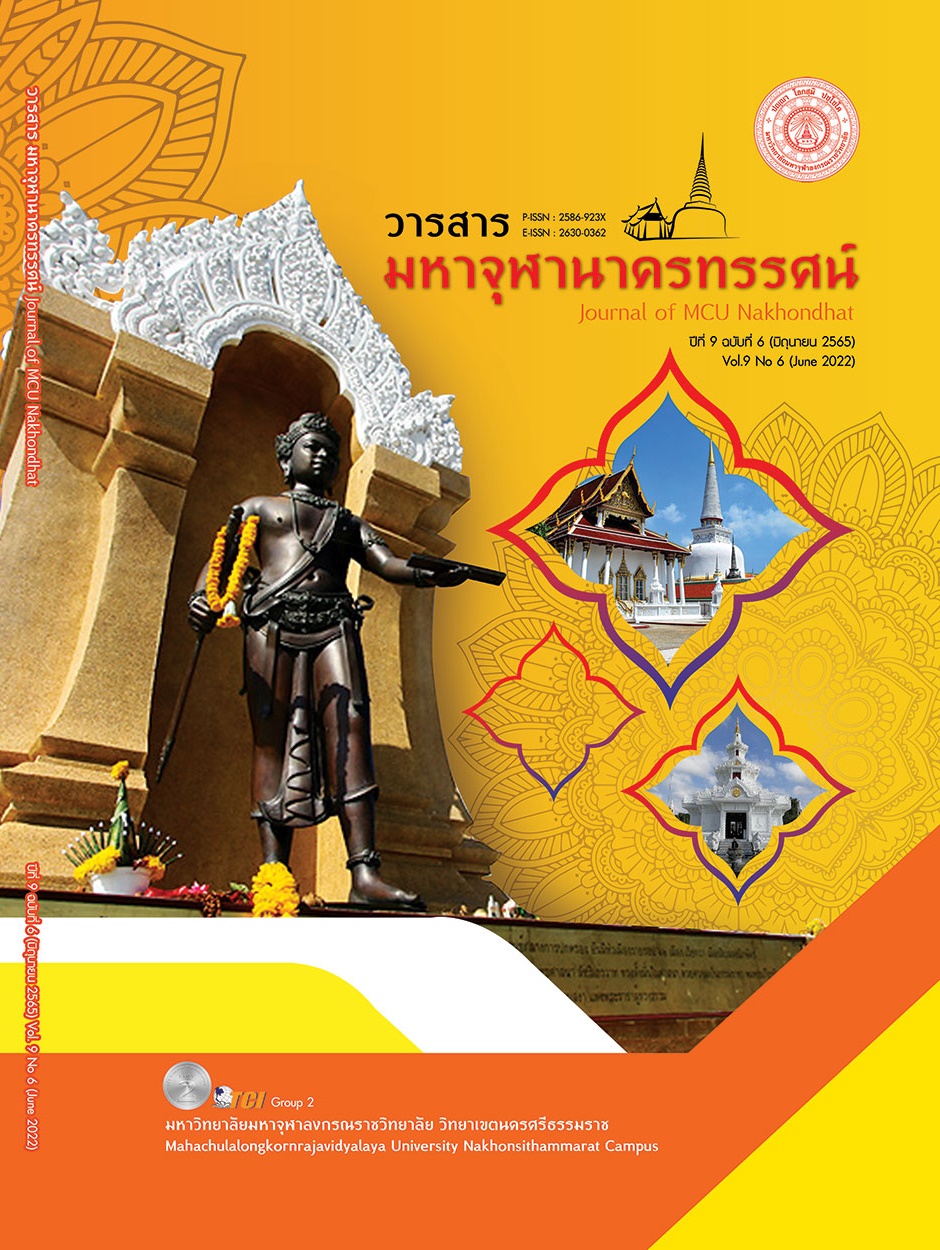DHARMA PRINCIPLES FOR CREATING AN ORGANIZATION OF HAPPINESS AT WORK
Main Article Content
Abstract
An organization is a group of people who come together to carry out an activity for the fulfillment of the objectives and set forth in the association that must be an organized contact, the division of labor and the coordination of individual interests as well. Creating happiness in the organization is therefore an important part in managing well-being of working happily. because individuals have different feelings and ideas, there is a need for principles of coordination within the organization. To create understanding and cooperation between person and person person to organization by relying on the principles of Dharma that must be driven together in all 4 areas. 1) Self-management according to the Sappurisadhamma VII, which is the principle that creates sustainability, non-intrusion, peaceful coexistence, has mercy on each other and knowledgeable about the world. 2) Personnel management according to the Brahmavihara IV, these are the noble Dharmas of the mind. Dharma that must be held as a principle and directing behavior and treating oneself to others. 3) Administration according to the Iddhipãda IV, which is the Dharma principle in work management to lead to success or morality to success in work and help the organization to succeed as intended. 4) Relationship management according to the Sangkhahavatthu IV, which is the principle that promotes helping, generosity, or helping each other in order to create unity and goodwill with each other, the four principles of dharma are the anchors and practices that form the organization's culture. unity Build quality of life for yourself, your family, and the society around you and have a love and responsibility towards the organization for working happily and creating sustainable happiness in the organization
Article Details

This work is licensed under a Creative Commons Attribution-NonCommercial-NoDerivatives 4.0 International License.
References
พระธรรมโกศาจารย์ (ประยูร ธมฺมจิตฺโต). (2549). พุทธวิธีการบริหาร. (พิมพ์ครั้งที่ 4). กรุงเทพมหานคร: โรงพิมพ์มหาจุฬาลงกรณราชวิทยาลัย.
พระธรรมปิฎก (ป.อ.ปยุตฺโต). (2552). ความสุข 5 ชั้น. เรียกใช้เมื่อ 10 มีนาคม 2556 จาก https://shorturl.asia/tDQHO
พระพรหมคุณาภรณ์ (ป.อ. ปยุตฺโต). (2559). พจนานุกรมพุทธศาสตร์ ฉบับประมวลธรรม. (พิมพ์ครั้งที่ 34). นนทบุรี: มูลนิธิการศึกษาเพื่อสันติภาพ พระธรรมปฎก (ป.อ. ปยุตฺโต).
พระมหากิจการ โชติปญฺโญ. (2558). การบริหารงานบุคคลตามหลักธรรมทางพระพุทธศาสนา. วารสารบัณฑิตศาส์น มมร, 13(2), 48-55.
ภัทรดนัย ฉลองบุญ. (2561). ความสุขในการปฏิบัติงานของบุคลากรภาครัฐ. วารสารสันติศึกษาปริทรรศน์ มจร, 6(พิเศษ), 590-599.
ษมาพร รักจรรยาบรรณ. (2560). สรรสาระองค์กรสุขภาวะ: แนวคิดและกรณีตัวอย่าง: องค์กรสุขภาพดี (Happy body). (พิมพ์ครั้งที่ 2). นครปฐม: โครงการพัฒนาและส่งเสริมการจัดการความรู้.
สมคิด ปิ่นทอง. (2556). รูปแบบการจัดการการกีฬาแห่งประเทศไทยให้เป็นองค์กรแห่งความสุข. ใน ดุษฎีนิพนธ์ สาขาวิทยาศาสตร์การกีฬา. มหาวิทยาลัยเกษตรศาสตร์.
สำนักงานพระพุทธศาสนาแห่งชาติ. (2561). หลักการบริหารงานสมัยใหม่กับหลักการบริหารงานเชิงพุทธศาสตร์. เรียกใช้เมื่อ 10 มีนาคม 2565 จาก https://shorturl.asia/QVoIm
สุวิทย์ ฝ่ายสงค์. (2563). ตัวแบบองค์กรแห่งความสุขของมหาวิทยาลัยสงฆ์. ใน ดุษฎีบัณฑิต สาขาวิชาการบริหารการศึกษา. มหาวิทยาลัยศรีปทุม.
อรวิภา จรูญจารุวัฒนา และคณะ. (2559). การบูรณาการหลักอิทธิบาท 4 กับการเรียนการสอนของศูนย์การศึกษานอกระบบและการศึกษาตามอัธยาศัย ตำบลหายยา อำเภอเมือง จังหวัดเชียงใหม่. วารสารบัณฑิตวิจัย, 7(2), 183-194.
อาภรณ์ ภู่วิทยพันธุ์. (2561). Competency Assessment Tool. (พิมพ์ครั้งที่ 1). กรุงเทพมหานคร: เอช อาร์ เซ็นเตอร์.
World Health Organization. (2017). promoting and supporting breastfeeding in facilities providing maternity and newborn services. ใน Guideline: protecting. WHO Document Production Service.


